
In the early afternoon of 29 November last year, several Palestinian boys descended on to their street in the occupied West Bank, where they often played together.
Minutes later, two of them lay dead from gunshots fired by Israeli soldiers – Basil, 15, and eight-year-old Adam.
As part of an investigation into the conduct of Israel’s security forces in the West Bank, which has been under military occupation for more than half a century, the BBC has pieced together what happened on the day the two boys were killed.
Mobile phone and CCTV footage, information about the movements of Israel’s military, witness testimony and detailed investigation of the scene, including taking measurements, combine to reveal evidence suggesting serious human rights violations.
The evidence we found has prompted Ben Saul, UN special rapporteur on human rights and counter-terrorism, to say the death of Adam appears to be a “war crime”.
Another legal expert, Dr Lawrence Hill-Cawthorne, described the use of lethal force as “indiscriminate”.
The Israel Defense Forces (IDF) said the circumstances of the deaths were “under review” but said “live fire is used only in order to remove immediate threats or for arrest purposes, following arrest protocols after exhausting other options”.
With violence having surged in the West Bank in the months since Hamas’s attack on Israel from Gaza on 7 October, the BBC has also found evidence of Palestinian homes being vandalised with graffiti, Palestinian civilians threatened with weapons and told to leave the territory for neighbouring Jordan, and the possible mutilation of the body of a Palestinian gunman.
Video footage from 29 November shows Basil standing next to a hardware store, its shutters firmly locked down. When Israel’s military arrives, shops close quickly in Jenin, a city in the West Bank – Palestinian territory which, unlike Gaza, is not run by Hamas.
Witnesses said gunfire had been ringing out from a nearby operation by Israel’s army in the Jenin refugee camp.
Adam, a football fanatic and massive Lionel Messi fan, stood with his older brother Baha, 14. There were about nine boys on the street in total, all captured on CCTV cameras that provided a nearly 360-degree view of what happened next.
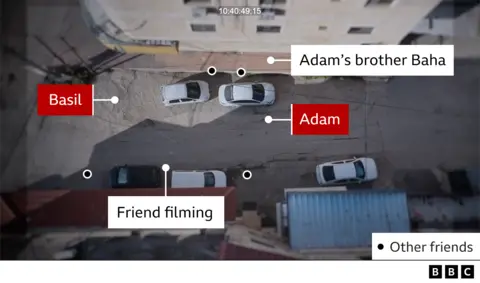
A few hundred metres away, a convoy of at least six armoured Israeli military vehicles turned a corner and began heading towards the boys, who clearly became uneasy. Several of the boys started to move away.
At this precise moment, mobile phone footage shows the front door of an armoured vehicle opened. The soldier inside had a direct view of the boys. Basil had darted into the middle of the road, while Adam was 12m further from the soldiers, running away.
Then at least 11 gunshots rang out.
Examining the scene, the BBC found the bullets struck a wide area. Four bullets hit a metal pole, two the shutter of the hardware store, one burrowed its way through the bumper of a parked car, and another pierced a handrail.
Medical reports obtained by the BBC show that two shots hit Basil in the chest.
Another bullet struck eight-year-old Adam in the back of the head as he ran away; his older brother Baha desperately tried to drag him to cover, leaving a trail of blood as he screamed for an ambulance.

But it was too late. Baha said Adam and his friend Basil died in front of him.
“I was in a state of shock; I wasn’t even thinking about myself. I tried to speak to him. I started saying, ‘Adam, Adam!’ But his soul was basically leaving his body because he didn’t answer,” Baha told the BBC tearfully.
Before being shot, Basil can be seen clutching something in his hand. It is not clear what it is. The IDF later shared a picture taken at the scene, which it says shows an explosive device.
Evidence from our investigation of the scene was shared with a number of independent experts, including human rights lawyers, a war crimes investigator and a counter-terrorism expert, as well as members of the UN and other, neutral bodies. Some gave their analysis anonymously.
The experts agreed the incident should be investigated and some went further, saying there appeared to be violations of international law.
Ben Saul, the UN special rapporteur on human rights and counter-terrorism, said there may be questions about whether lethal force could have been used legally in Basil’s case, if he was holding an explosive.
“For Adam, this appears to be a violation of the International Humanitarian Law prohibitions on deliberately, indiscriminately or disproportionately attacking civilians, a war crime, and a violation of the human right to life,” Mr Saul said.
Dr Lawrence Hill-Cawthorne, co-director of the Centre for International Law at the University of Bristol, said: “The soldiers were in armoured vehicles. Even if there was a threat, they should have driven away and planned an arrest, rather than defaulting to apparently indiscriminate, lethal force, which is a violation of international law.”
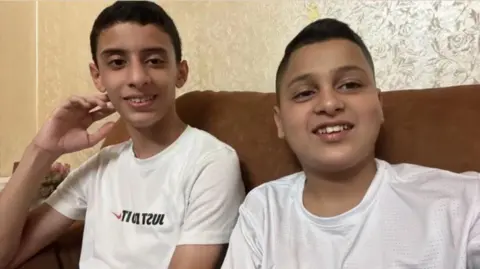
The IDF said Basil, left, was holding an explosive when he was on the street with his friend Baha, right
The IDF said the suspects had been about to hurl explosives towards their forces, putting them in immediate danger. “The troops responded with fire and hits were identified,” Israel’s military said.
But according to the video evidence we have examined and witness testimony, Adam did not appear to have been armed and had been running away when he was shot in the back of the head.
The IDF said the circumstances of Basil and Adam’s deaths are “under review”, which it does routinely for every death of a child in the West Bank due to IDF activity.
But several former Israeli soldiers who viewed the BBC’s evidence said they believed Israel’s legal system would protect soldiers who used lethal force, regardless of whether it was justified.
One former sergeant who served in the West Bank from 2018-2020, said it would take “an Israeli soldier murdering a Palestinian at zero range for it to be taken as murder in Israel” and “there is basically a 0% chance of criminal proceedings” against a soldier in cases such as Adam’s.
Data from the Israeli human rights group Yesh Din suggests that fewer than 1% of all complaints against Israeli soldiers result in prosecutions.
Footage of the Hamas attack on 7 October, in which about 1,200 people were killed and 253 taken hostage, outraged the Israeli public and shocked the world. Since then, the world’s attention has been focused on the war and humanitarian crisis in Gaza, where more than 34,000 people have been killed, according to the territory’s Hamas-run health ministry.
At the same time, military operations by Israel have also surged in the occupied West Bank, making last year the deadliest year on record for children there.
A total of 124 children were killed in 2023, according to Unicef – 85 of whom were reported killed after 7 October.
So far in 2024, 36 Palestinian children have been killed in the territory by Israeli settlers or the military.
Since the West Bank is not classed as a war zone, the use of force is meant to be more constrained, according to international law.
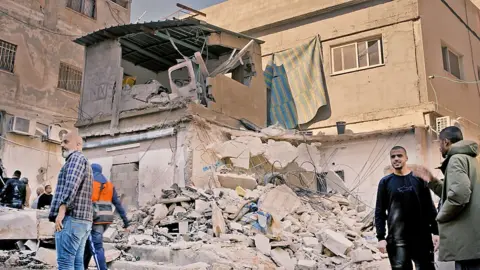
There were scenes of destruction in Tulkarm Refugee Camp following an IDF operation
While the IDF keeps its exact rules of engagement secret, former and serving Israeli soldiers told us the use of lethal force was meant to be a last resort where there is a real and imminent danger to life. A staged approach should be taken.
They say this begins with a verbal warning in Arabic and Hebrew, before escalating to the use of non-lethal weapons such as tear gas, then shooting at the legs, all before shooting to kill.
The BBC was given access by the Palestinian Authority-run health ministry in the West Bank to medical reports of 112 children, aged between two and 17, who were killed by Israeli fire forces between January 2023 and January 2024. We cannot know the exact circumstances of all of these shootings, and it is possible that some genuinely posed a threat to the lives of Israeli soldiers.
But our analysis showed that about 98% of them had injuries to the upper body, where a shot is more likely to be fatal, meaning that soldiers could be shooting to kill more often than wound in these cases.
It raises questions about whether soldiers are following the rules of engagement in the West Bank and the culture around how they use lethal force.
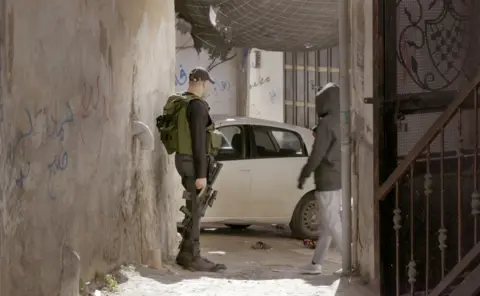
Israel says its military operations in the West Bank are conducted against Palestinian armed groups
Over a period of five weeks in the West Bank examining the impact of military operations, we saw evidence of several incidents which raised serious questions about the army’s conduct.
The BBC witnessed a 45-hour military operation by Israel in Tulkarm refugee camp in January 2024, targeting an armed group known locally as the Resistance.
Afterwards, several Palestinians told us they had been threatened by soldiers at gunpoint and told to move to neighbouring Jordan. The IDF has said it will review any complaints about civilians being threatened.
Haytham, a 12-year-old Canadian-Palestinian boy, said he had been threatened at knife-point by an Israeli soldier, a claim backed up by his brother and father.
In one family home in the camp, we found a mural of al-Aqsa mosque, the third holiest site in Islam, that had been defaced – allegedly by Israeli soldiers.
An adjoining wall bore the Star of David, spray-painted, and another had “7 October” in Hebrew written on it, a reference to the Hamas attack.
The IDF has said that this vandalism “contradicts IDF values” and is contrary to what it expects from its soldiers.
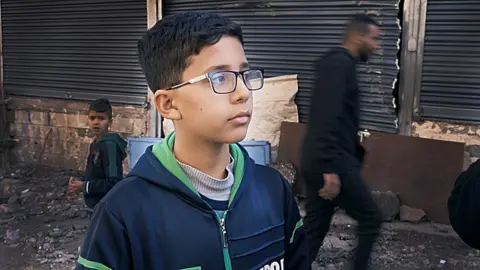
Haytham, 12, said soldiers destroyed “everything” in their home and one threatened them with a knife
Upstairs the house had been ransacked, with kitchen cabinets smashed, children’s toys damaged, and televisions broken. It was a similar picture in house after house, throughout the camp.
Dr Eitan Diamond, a senior legal expert at the Diakonia International Humanitarian Law Centre in Jerusalem, said that “vandalism, such as spraying the Star of David or ‘October 7′ on walls, is clearly unlawful”.
The reports about a child being threatened with a knife in Tulkarm camp – and others being threatened at gunpoint – could also be breaches of international law, he said.
In the same IDF operation, after soldiers shot dead an alleged Palestinian fighter who may have been carrying explosives, witnesses told us that his body had been urinated on, struck, bound and then dragged down the street.
The BBC was shown photos of a bound body. Examining the bloodstained scene, we found cloth and cable left behind, which was consistent with the material used to bind the body in the pictures.
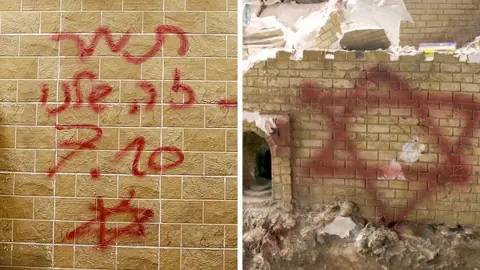
A wall was sprayed with a Star of David and the date 7 October written nearby
Our evidence was again shown to independent experts. Prof Marco Sassoli, an international law expert from the University of Geneva, said: “Remains of the deceased, even if they were lawfully killed, must be respected. What you report violates international humanitarian law and may even constitute a war crime.”
The IDF said that after examining the dead fighter, explosives had been found and Red Crescent personnel refused to touch the body. “For this reason, IDF troops had to restrain his hands and feet to ensure their safety and to check if there was weaponry under the body.”
Some of the former Israeli soldiers who reviewed the BBC’s evidence said they were afraid that the culture of IDF operations in the West Bank was further stoking Palestinian armed resistance.
“To assume that people can interact with the army the way Palestinians do on a daily basis and still go about their lives as if nothing happened – that people living in this reality will not take up arms – is at best naive and dehumanising,” one said.
“Things are getting worse.”
Source: BBC






